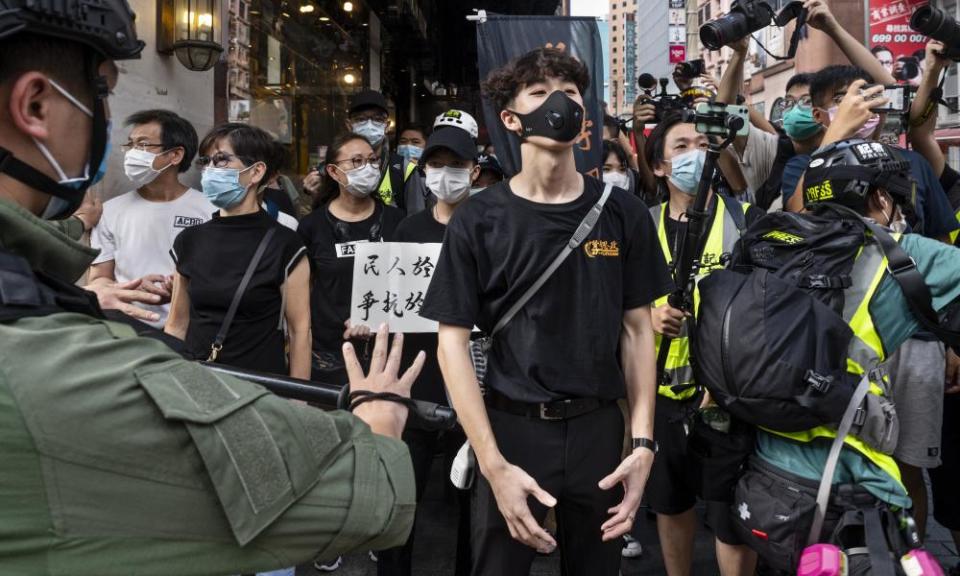Australia's treaty row with Hong Kong means help with police investigations 'on hold'

Australian law enforcement agencies have made seven requests to Hong Kong for help with investigations that will now be placed “on hold” because a legal assistance treaty is in limbo, an inquiry has heard.
After the Australian government announced it would suspend the extradition treaty because of concerns about the impact of China’s sweeping new national security laws, Hong Kong authorities hit back by informing Australia a second treaty – the mutual legal assistance treaty – would also be paused.
Australian government officials said on Thursday authorities had typically used this second treaty to seek help from their Hong Kong counterparts as part of investigations into crimes such as money laundering, fraud, forgery, proceeds of crimes and drugs matters.
The types of assistance sought included copies of bank or government records or witness statements.
Related: Australian academics Clive Hamilton and Alex Joske banned from entering China
Karen Moore, an assistant secretary in the attorney general’s department, said there were currently seven outstanding requests for legal assistance from Australia to Hong Kong, while there was one current request in the other direction.
She told the joint standing committee on treaties these requests were now “effectively on hold”.
Officials confirmed this development could have “some impact” on the Australian investigations, although in most matters law enforcement agencies had reported they were hopeful of being able to proceed with evidence gathered from other sources.
The testimony provides some insight into the spillover consequences of Scott Morrison’s decision in July to suspend Australia’s extradition treaty with Hong Kong on the basis the new national security law imposed by Beijing amounted to a “fundamental change in circumstances”.
Evidence presented to the committee reveals Australia notified Hong Kong of its intention to suspend the extradition agreement in a diplomatic note on 9 July. This would have posed minimal immediate practical impacts because there are no current extradition requests.
But the Australian government says it received a reply on 28 July declaring Hong Kong had decided to not only suspend the extradition agreement but also to unilaterally suspend the mutual legal assistance agreement.
The Law Council of Australia’s president, Pauline Wright, said any potential effect on Australian authorities’ investigations would not be significant enough to outweigh the concerns about the national security law that had prompted Canberra to act.
Wright said the law’s “broadly defined offences” undermined civil and political rights, and its reach may extend beyond Hong Kong residents and citizens to include Australians whose extradition may be sought from offshore.
“The national security law substantially undermines the independence of Hong Kong’s judiciary,” she told the treaties committee, which is conducting a short inquiry into the Australian government’s handling of the two agreements.
David Grace QC, a member of the Law Council’s national criminal law committee, said the impact of the national security law may become clearer over the coming 12 months. He was concerned it was “going in only one direction and that’s adverse to the citizens of Hong Kong”.
“I can’t see the situation changing any time soon,” Grace said.
“There may be a lull or some appeasement made publicly given the threat to the 2022 Winter Olympic Games in Beijing. That might see some window dressing perhaps on the part of the PRC [People’s Republic of China], but I cannot see them backing down in any way to what is occurring at the present time on the ground.”
Sue Robertson, the first assistant secretary of the attorney general’s department, said Australia was “troubled by the law’s implications for Hong Kong’s judicial independence and the rule of law and on the rights and freedoms enjoyed by the people of Hong Kong”.
“It was also concerning that the decision to impose [the law] was made without the direct participation of Hong Kong’s legislature or judiciary,” she said.
Related: China halts Hong Kong extradition treaties with Canada, Australia and UK
Donald Rothwell, a leading professor of international law, said he was “not absolutely convinced” that Australia had set out a legitimate basis to invoke article 62 under the Vienna Convention, which explains limited circumstances in which a “fundamental change of circumstances” can be invoked by one party to suspend or cancel a treaty.
“I don’t think the fact that a country troubled by the national security law is really a sufficient basis to really be able to appropriately invoke article 62, given the very strict criteria that I’ve referred to,” Rothwell said.
Simon Henderson, an international human rights lawyer, said the enforcement of the national security law in the last three months had “confirmed Hong Kong society’s worst fears, including widespread crackdown on freedom of speech and political persecution”.
Henderson said that in his previous role as a senior policy adviser at Justice Centre Hong Kong from 2017 to 2019, he had “consistently highlighted the need for the international community, including the Australian government, to be more assertive in policy and legal responses towards Hong Kong, outlining its disturbing trajectory and Beijing’s increasing interference”.
“Those actions now would be considered an offence under article 29 of the national security law, considered to be collusion with foreign forces,” he said.
Australia-Hong Kong Link, a network of Australia-based volunteers with ties to Hong Kong, argued the dangers of the national security law had already been seen with the interception and detention of 12 activists fleeing Hong Kong for Taiwan.
Australia plans to write to Hong Kong soon to formally consent to the suspension of the mutual legal assistance agreement and bring the extradition treaty suspension into effect.

